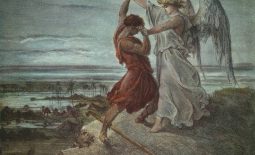The Heritage of the Sword
He gripped his little brother’s hand, his stomach churning with fear and embarrassment, his fingers slick with his own sweat. He didn’t dare look at him; the lids of his eyes weighed down by shame and grief, for he knew what was yet to come. Instead, he cast his gaze upon the dust of his feet, eddies of desert sand swirling about his ankles.
Kaboom-kaboom-kaboom. A monstrous heartbeat, louder and louder, yet it was not his own. It was the hooves of the steed that the Commander rode, black and imposing, tearing through the wilderness. The Commander was equally fierce; tall, brutish, his features angular, his black beard cropped efficiently. A battle scar cut across his face, from the right corner of his mouth to where his left eye had been. They say that he was the right man of Pinchas. These were not just the scars of an enemy without. It made the man even more menacing.
The Commander raised his sword; a grey, curved, rugged blade edged with uncompromising sharpness. It was not a beautiful weapon; the Commander not a beautiful man. There was little knightly or noble about him; only ferocity poured into human form.
The eddies around his feet pinned him down, as if the will of his body had left his limbs, only to shackle his nefesh, his life-force, to his cramped hands.
‘Steady your heart, achi’, his brother whispered to him. Achi, my brother. How often had he called him that when they were growing up? When he had hoisted him on thin, stringy shoulders, when they had carried out mischief among the tents of their nightly encampments. His tongue felt haggard like a dull blade, the knuckles of the younger one’s hand cutting into his digits. If only he could now cleave words like the Commander cleaved the heavens, with sword and steed and prayers, ringing loud in the hot dessert air, the righteousness and anger of their God proclaimed above the wavering host.
Instead, he was reminded of what he was so much better at and how little it served him now; weaving words of poetry. She had loved them; snippets of song and verse, little ditties about long-gone cool evenings by the Great River, small promises that tickled her heart, that made her laugh and long for him. ‘Oh’, she had teased back, ‘you are not a fighting man, but a man made for loving instead!’ as she played with his long fingers. ‘These gentle hands’, she would whisper, ‘may write upon the tablet of my heart.’ And he had pulled her behind the tents where he had prowled with his brother only years prior, and hungered for her skin, rejoicing in the communion of her touch.
‘Is there anyone who has built a new house but has not dedicated it?’ The Commander’s sonorous voice rolled across the plain. ‘Let him go back to his home, lest he die in battle and another dedicate it.’
As one of the few scribes of his tribe, he had started setting aside the coins he had gathered for his services; writing down the Law of Moses; drawing up wedding contracts and writs of divorce, sealing the affairs of business and tribal governance. Slowly, the coins started gathering in his old leather purse. But he had not yet built a house or acquired land. He bit his lip, knowing that he would be called to fight.
‘Is there anyone who has planted a vineyard but has never harvested it? Let him go back to his home, lest he die in battle and another harvest it.’
She had helped him hone his skill, in brittle terracotta pots, cracked and weather-worn, but good enough for the business of raising seed. Grapevines, cucumbers, melons—their seeds carefully carried from the Land of the Great River. Onions and garlic to warm a winter dish, greens to cool down a summer’s fare, these pots stood by the gardens of her mother; a promise germinated but not yet fulfilled. He knew he would be called to fight.
‘Is there anyone who has paid the bride-price for a wife, but who has not yet married her?’
He had unstrung his old purse, taken out the amount stipulated by the Law, and half more. The first, he had given to her father. With the rest, he had gone to the weavers and the smiths. Make her a dress of fine linen, embroidered in purple at the hem, a fringed cloak of scarlet wool, a diadem of silver set with lapis lazuli, bright as the eyes of the sky. He had brought her these, as a token of his love, and she had readily accepted them, with kisses sweet as wine, and a promise for more.
A mere promise it was. They had not yet been covenanted to each other as her face appeared before him in the gaze of his mind; hard-edged and haloed by the sun of high-noon, her brow cast in shadows, her dark eyes gleaming.
His palms felt oily, his fingers curled around his brother’s. Tears bit in his eyes, snaking down dusty cheeks. He glanced sideways and observed him; a strong young man, lithe and supple, easy muscle resting comfortably beneath bronze skin. A determined chin and a knotted brow; intent and intense, brave and resolute. Already from the days of squat toddlerhood, that is how he had been; the Esau to his Jacob.
‘I cannot do this,’ he spluttered, leaning into the presence of the hardened young man beside him. ‘I love her. I want to write. I – I want to scribe the Law and study it; record the songs of our people. I want to tend to our garden…’ Hot rivulets now streamed down his face. An image of a bonny babe bouncing upon his knee. A memory of what had not yet come to pass.
‘Go, achi.’ His brother’s voice was urgent yet tender. ‘Go home. If you are afraid, go for both of us.’
‘How can I leave you? I cannot.’
He heard him snort. ‘Nor can you stay, unless you intend on using your quill as your dagger.’
A jagged rock lodged in his gullet, all his nefesh bound up in it; burning and hard.
‘Your sword is your heritage, achi’, he replied softly. He let his fingers slip from the vice of his fears and the grip of his love. The eddies at his feet scattered as he took a step back, unweaving his way through the host of men on the plain. He did not look back, lest he become a pillar of salt.
From the bitter seed of his cowardice, he grew a new life. From the wells of his love, he tended it. A small but productive homestead on the west side of the Jordan, where they tended to gardens and sheep by day and scribed by the wick of an oil lamp. There he sat, a bonny babe bouncing upon his knee; this plump little lad, his comely wife hovering by their side with baskets of fruit, her linen dress cool against the summer sky. He coiled his gentle hands around the soft, fat little fists of his boy, unfurling the fullness of his love.
Achinoam, they had named him. A heritage for the uncle who had stayed.




